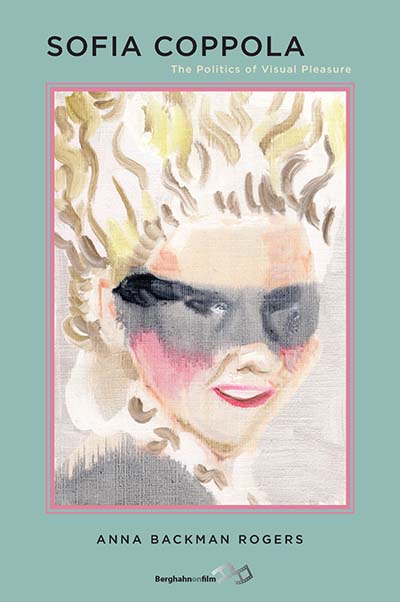
In the spirit of esteemed director Sofia Coppola’s fiftieth birthday on 14 May, 2021, we are delighted to share an excerpt of the introduction to Anna Backman Rogers’ award-winning title Sofia Coppola: The Politics of Visual Pleasure.
Purchase Sofia Coppola: The Politics of Visual Pleasure in eBook format via our website for 20% off with discount code SOFIA50 (offer valid until 16 May, 2021).
The Surface of the Image is Political
Anna Backman Rogers
Sofia Coppola possesses a highly sophisticated and intricate knowledge of how images come to work on us; that is, she understands precisely how to construct an image – what to add in and what to remove – in order to achieve specific moods, tones and cinematic affects. She knows that similar kinds of images can have vastly different effects on the viewer depending on their context: an image redolent with nostalgia and melancholy may contain or presage harm or threat in The Virgin Suicides (1999), and yet when transcribed to the setting of couture (Marc Jacobs’ ‘Daisy’ campaign), it will signal bucolic and halcyon youthfulness devoid of any sinister atmosphere. This monograph is an extended study of Coppola’s outstanding ability to think through and in images. In what follows, from a resolutely feminist perspective, I will explore the mood, texture, tone and multifaceted meaning of Coppola’s aesthetic. In short, I will take my cue from Coppola herself and take images and the affect and effect of images seriously by reading surface in order to reach depth. It is my belief that this is the essential work that Coppola’s oeuvre asks of us as viewers: if we cannot engage with the surface of the image as a provocation, we miss its signification entirely. Surface, then, is deeply meaningful in Coppola’s diegetic worlds.
Yet the surface of the image is continually denigrated as mere frippery – an insubstantial substitute for hard, scientifically rigorous, implicitly masculine knowledge (often associated with language rather than the image, or diegesis rather than mimesis). The image – especially the decorative image – is viewed all too often as seductive, beguiling, deceptive and false. In her groundbreaking study of the ‘pretty’ image, Rosalind Galt writes that ‘even in the context of a positive evaluation of content, pretty images lead inevitably to the spectre of empty spectacle’ (Galt 2011: 12). Film studies in particular has devoted a suspiciously copious amount of time to defaming decorative images and, moreover, associating this kind of image with femininity and femaleness; in other words, it is a discipline (alongside film criticism) that has worked assiduously to insist that there is nothing of import to consider once the curtain (surface and spectacle) is drawn back. As such, there is, I suggest, an alarmingly misogynist agenda at play here. My contention is echoed in Galt’s suggestion that: ‘The rhetoric of cinema has consistently denigrated surface decoration, finding the attractive skin of the screen to be false, shallow, feminine, or apolitical’ (Galt 2011: 2). Moreover, Galt notes that: ‘Many critics hear in the term (pretty) a silent “merely” in which the merely pretty is understood as a pleasing surface for an unsophisticated audience, lacking in depth, seriousness, or complexity of meaning’ (2011: 6). Alongside Galt, I insist that the image itself as spectacle contains manifold signification and that this is what must be borne in mind when we are asked to attend to images such as those produced by Coppola. It is no coincidence, to my mind, that Coppola’s latest film, The Beguiled (2017), overturns the clichéd priapic narrative of its original (The Beguiled, Don Siegel, 1971) by relating events from a female perspective through the trope of visual beguilement. Coppola has, after all, always displayed an acute understanding of how to use a phallic economy of images and words against itself. Feminist politics is, for her, a question posed through production design.
About the book
CHOICE OUTSTANDING ACADEMIC TITLE 2019
SOFIA COPPOLA
The Politics of Visual Pleasure
Anna Backman Rogers
“Rogers’s book led this reviewer to rewatch some of Coppola’s films and decide that at least Lost in Translation (2003) and Marie Antoinette (2006) are masterpieces. What can be better than a book of criticism that leads one to revise one’s own aesthetic judgments?” • Choice
All too often, the movies of Sofia Coppola have been dismissed as “all style, no substance.” But such an easy caricature, as this engaging and accessible survey of Coppola’s oeuvre demonstrates, fundamentally miscontrues what are rich, ambiguous, meaningful films. Drawing on insights from feminist philosophy and psychology, the author here takes an original approach to Coppola, exploring vital themes from the subversion of patriarchy in The Virgin Suicides to the “female gothic” in The Beguiled. As Rogers shows, far from endorsing a facile and depoliticized postfeminism, Coppola’s films instead deploy beguilement, mood, and pleasure in the service of a robustly feminist philosophy.
Purchase the eBook for 20% off with discount code SOFIA50 (Offer valid 14 May 2021 – 16 May 2021).
Stay connected
For updates on our Film and Television Studies list as well as all other developments from Berghahn, sign up for customized e-Newsletters, become a Facebook fan, follow us on Twitter and Instagram, and listen to our podcast, Salon B, on Spotify.


